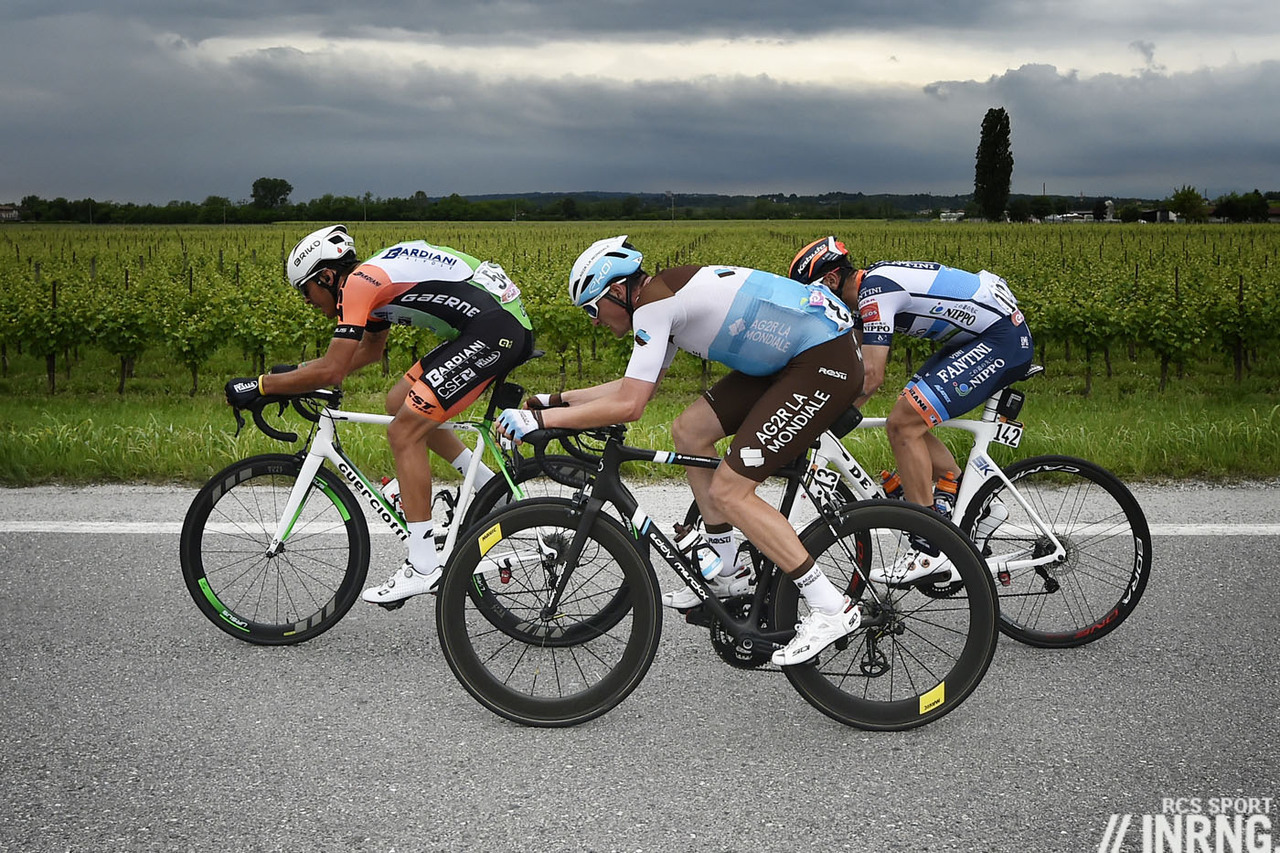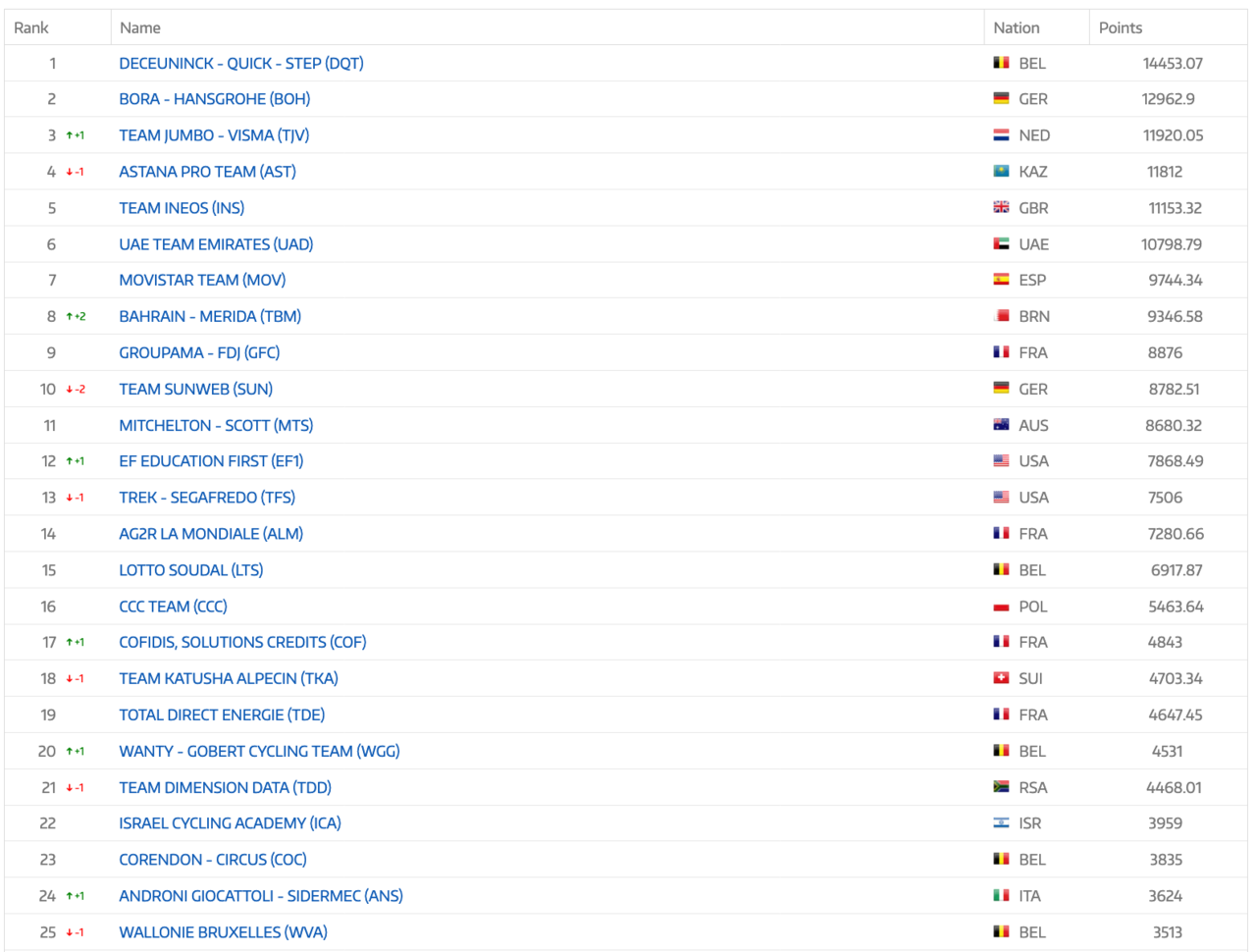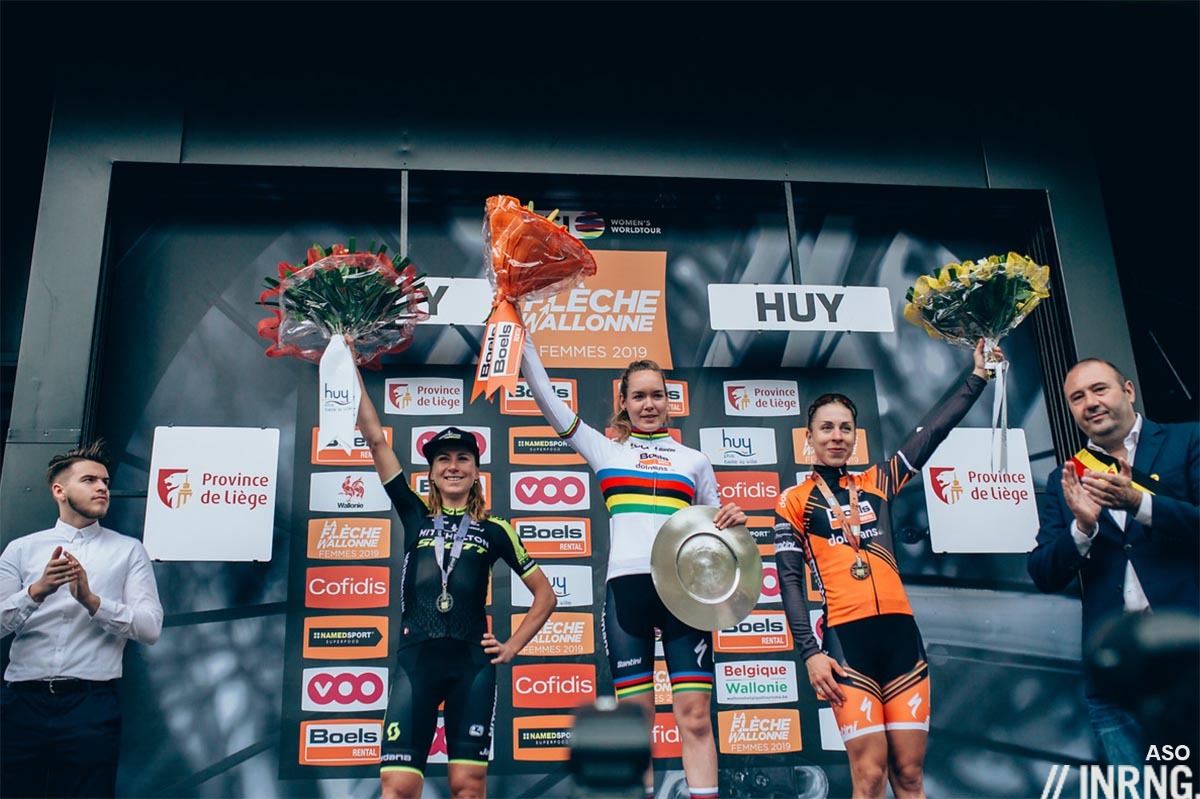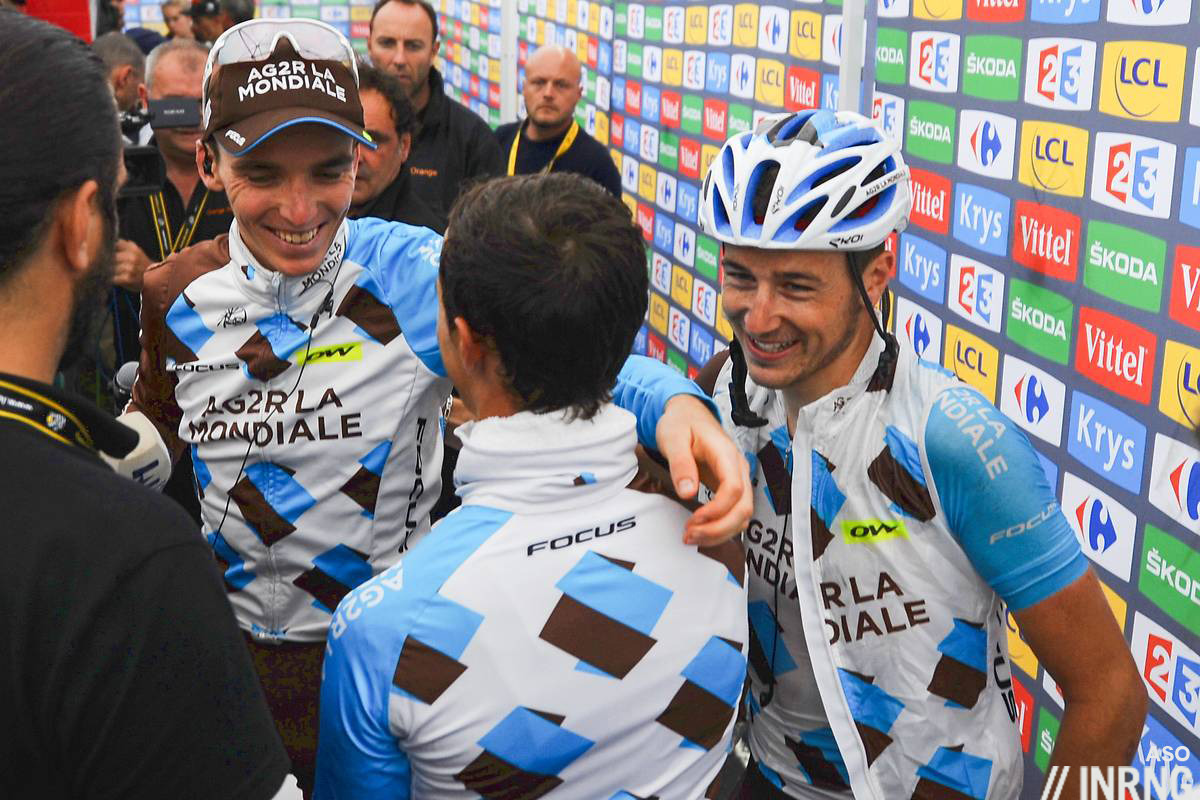
La Gazzetta Dello Sport reports that the men’s UCI World Tour could go from 18 teams to 20 with Total Direct Energie and Cofidis the most likely squads for promotion. It wasn’t that long ago that the talk, or rather the press statement, was for a move from 18 to 16 teams.
What does 20 teams mean? Well only two wildcard invitations for the grand tours for starters so look at Italy where Androni, Bardiani, Neri Sottoli and Nippo-Vini Fantini compete for an invite every year, now their chances are reduced, especially if other teams like Gazprom or Israel Cycling Academy can tip some coin into RCS’s piggy bank. Do Cofidis and Total Direct Energie really want to ride the Giro? Well yes for Cofidis as they have a consumer loans business in Italy while TDE have bike sponsor Wilier but as their sponsorship manager said the other day the main sponsor doesn’t have any business in Italy. But being World Tour will also mean a minimum of 27 riders, up from 23 currently and that means a roster where most will want or even need to bank at least one grand tour in their legs each season. And by implication it says to any rider considering signing for, say, Israel Academy or Vital Concept that they might never get to ride a grand tour for the duration of their contract meaning smaller teams can’t sign the big riders they need to get invites. Catch-22.

More than ever it makes the World Tour an ersatz closed league, first because poorly-performing teams like Dimension Data – as the screengrab from the UCI website shows they’re faring worse than Wanty-Gobert – are kept in the top flight regardless; and second because the World Tour calendar will be ridden almost exclusively by the top-20 teams. We’ll see, remember various iterations of UCI reforms have been announced only for a fraction of them to see the light of day. All of these changes sound sudden, they’d have such an impact on the Pro Conti teams and their ecosystem that announcing now that this will happen in 2020 seems too sudden, there should be more time to let these teams plan.

Onto UCI announcements that should happen and the UCI has announced the calendar for 2020. On the men’s side the Tour de France and Vuelta a España start a week earlier to fit around the Tokyo Olympics, meaning a June start for the Tour and a broiling mid-August start for the Vuelta. The Tour of Turkey is gone and perhaps few will lament this but here was a chance for a big race outside of Europe in a large country – read market – only it’s off. For the women’s peloton Liège-Bastogne-Liège and Flèche Wallone are on the calendar, despite plenty of copycat stories saying otherwise.
Staying with women’s cycling and the FDJ Nouvelle Aquitaine Futuroscope team have announced their intention to apply for a World Tour licence for 2020 meaning they want to sign up to the higher regulatory standards set by this level. Good on them. They’re sponsored by FDJ but are not the women’s team of Groupama-FDJ, they just share the same title sponsor and sometimes gather at presentations because of this.
FDJ is being privatised. It’s currently owned by the French government but reportedly being lined up for sale. It’s been on the cards for some time but apparently has a green light now for this summer. The significance of this? Just that new ownership and in time management could mean new priorities and so they might not always stick around in cycling.

One sponsor that is staying is Ag2r La Mondiale who have announced an extension of their deal to 2023. The team – one of the few to publish their accounts – has grown alongside the sponsor with Ag2r going from a small insurer to one of France’s largest in the last 20 years.
Will Dimension Data change name? Just as Sky switched to Ineos this year, one thing to look out for is whether Dimension Data becomes NTT in July. Dimension Data was bought by Japan’s NTT in 2010 and on 1 July Dimension Data will be rebranded around the world as NTT. This probably isn’t a big deal for you, but for the company and its marketing efforts it’s huge and we’ll see if the Dimension Data team is part of their message. A relaunch and new jersey on the eve of the Tour would be a great way to help spread the word, especially as the company is also a “technology partner” to the Tour de France too.

Or perhaps to put it another way, does France need four World Tour teams?
Watching that magnificent football match on television last night of the French women v USA and the atmosphere it created, it brought home that the French certainly need a home team to win the TdF.
If you could chose a French creme-de-la-creme from the proposed 4 teams, do you get a Tour winning squad from it?
I’m not sure. The most obvious type of rider lacking would be the ‘Super TT’er’.
The new teams, and money, needs to develop one or two.
I would *love* to see a French winner of the Tour, it would be spine-tingling to witness.
Even more so on a French team,
I’m so glad I checked damn autocorrect otherwise it would have been ‘crime-de-la-crepe’ 😃
‘crime-de-la-crepe’
Think they’re savoury pancakes.
A meal time at FDJ and, to the horror of Madiot, Miles Scotson puts Marmite on a crepe perhaps?
Vegemite, Ecky, Vegemite.
Serial crepe killer 😀
It’s a good point, they are spread a bit thin. On the other hand Spain and Italy used to have similar amounts, maybe its more an indictment of the financial situation in those countries (or whatever it is/was that caused the mass folding of their teams in the last 10-15 years).
It only recently struck me that there arguably isn’t an Italian team in the World Tour anymore – Liquigas and Lampre were the last holdouts and neither of them are at all “Italian” anymore.
UAE Emirates are “functionally Italian” even if the money isn’t.
Or does the World Tour, which is basicly races within the EU, need a taxhaven finnanced & soon to be registered outside the EU team ?
Re: the team standings chart above
Really? Counted to the nearest one hundredth of a point? That is just silly…
But the thing I wanted to get at is what the standings imply. The talent is grossly stratified. Maybe we can enjoy competition among the top half dozen teams over the course of a season, but what do the rest of the teams hope for? What are their athletic missions and goals (beyond brand recognition)?
What with all the chatter and the new enterprises proposing to change the sporting culture of cycling (the Hammer series, Rapha’s ruminations, the UCI fiddling), the team scoring system stands out to me as undervalued. Certainly at present the standings are irrelevant to most fans, but there’s at least one reason why that could change. I’m wondering if some of the initiatives are designed to eventually institute a draft thru which the lowest placed teams get first shot at young riders, similar to the US pro team sports structure. It would be interesting to observe some of the bottom teams recruiting the next Remco Evenepoel or Ivan Sosa, and all the intrigue involved (potential trading of draft choices, bigger teams trying to purchase draft rights, etc). Seems like this could be a way to reduce the vast inequality of outcomes, even if over the long run the best-funded teams continue to have disproportionate success.
I dunno, it’s early morning here, and I need coffee…
No. Nobody outside of the US understands how that works. Plus its based on everyone emerging as free agents (from college). Why should say AG2R or Total lose out on the next big thing that has emerged from their own development system just because they are well run and have done well (hypothetically) and Dimension Data are not?! European sport doesn’t work that way.
I agree. Also, why should a great rider be stuck on a rubbish team for years?
It’s always struck me as ironic how communistic US sports are.
No argument from me about the weird antitrust exemptions big-time US sports get. It is a source of constant amusement to me how the leagues complain about salary caps and small v. big markets while effectively printing money via the television contracts and government protections.
And I see the point about offshore confusion over the draft functions. But even major league baseball, with its minor league feeder teams, holds a draft, proving it’s not impossible to meld the processes.
The Australian Football League has a decent method of holding a fair draft while also allowing for certain players (academy players and father-son players) to be reserved by their clubs.
Reserved players are nominated for the draft like any others, with the club which has the reservation on them being required to use their next available pick following another club calling that player’s name. The club which called the reserved player then gets to re-take their pick.
For clubs which choose to prioritise father-son picks or making good use of the academy system, this often results in them having to ‘pay’ for that choice by using their first round draft picks for players who probably wouldn’t be picked until later.
This sort of method could be a fair way of applying a draft in pro cycling. Another possibility would be a simpler method of giving each team one pre-draft selection from their own linked development team, which would serve as an incentive for pro teams to link with a development team.
Err, totally lost!
US sports aren’t communistic, they’re capitalism in excelsis. They’re closed cartels with a small group of enormously wealthy private owners looking out for each other’s interests.
I’d tend to agree with this. If they were “communistic” then the fans and others stakeholders would share mutually in the profits (or losses). Proposals to establish closed sports leagues are often about establishing monopolies from which the new private owners can extract rent.
Pro cycling could learn from some leagues, for example making the World Tour brand more consistent and strong and we should get news on pooled TV rights for different races soon, but the current atomised structure means nobody can come along and impose a completely different model for now.
I only meant in terms of the draft.
“US sports aren’t communistic, they’re capitalism in excelsis”
They’re not capitalism — they’re “cronyism” at its worst. The owners of these ball&stick sports are constantly at the government’s teat, lobbying local politicians for mega-coliseums built at taxpayer expense, and promoted with pie-in-the-sky fantasies about how many “jobs” will be produced or “synergistic” benefits to the community.
Australian Rules Football also has a draft, but your other points are valid. Personally, I don’t have too much of a problem with the cycling set up. Even though the same teams are always winning, it’s not always the same rider. Given that I don’t care about team rankings, that’s fine.
I think there’s a limit to how relevant standings can really be. Sports with year-long champions either have fairly easy-to-understand point systems (most field sports, to some extent, motorsport), or have playoffs which are less fair but exciting.
On the other hand, nobody really cares about the year-long champion of golf, despite their best efforts. Tennis’s various year-end championships are a bit more successful but can you really replicate that in cycling? I’m honestly fine with rankings being pretty irrelevant, the excitement in cycling is primarily on a race-by-race level, and not by seeing who gets the most points in a year.
It’s also not clear that “inequality of outcomes” is inherently a problem. American sports is the prototypical closed-garden franchise model which effectively runs as a cartel, and the result there are things like teams owned by owners who don’t bother running a good team because they know they live in a sports-mad city and fans will show up to see an awful team anyway, teams which intentionally lose as many games as possible to get a good draft pick, teams colluding to drive down player wages. and most concerning, teams extorting hundreds of millions of dollars out of local governments because the franchise model means that if your team moves, you can’t just start up a new one and get it promoted into a high tier within a few years.
It’s worth noting that in club football, the big name sugar-daddy/wealth fund teams (Manchester City/Juventus/PSG et al) are pushing to try to replicate this model by a) making it harder for “establishment” teams to drop out of the Champions League, and b) using this as a trial balloon for a closed-garden European super-league, because they’re all looking at the NFL’s closed circle model and salivating.
Rankings don’t work so well in cycling because it’s a complex sport where the likes of Peter Sagan, Dylan Groenewegen, Julian Alaphilippe, Chris Froome, Vincenzo Nibali may start the Tour de France but it’s pointless – or rather a long café corner discussion – trying to work out who is the best. They each have different objectives in the season, different goals in the race etc. So rankings end up as a subjective exercise in arithmetic, a UCI committee decides how many points the Tour or Giro winner gets etc, if they think stage wins are important you allocate more points to them, if classics are instead then they get more weight etc. The sport is more complicated and arguably all the richer because of this.
Cycling’s specific dynamic of being a team sport where an individual gets all the credit is a big reason rankings frequently don’t make sense, but it’s part of the charm of the sport too.
I think the World Cup (i.e. picking 7-8 big one-day races and having a year long competition out of them) was as good as you can get, but the benefits of something like this are more along the lines of having consistent TV packaging/production to make it easier to promote cycling outside of Europe than anything else. (the current US situation where ASO sells their rights to NBC while Flosports pick up the pieces is irritating for that specific reason)
The decimal places in the scores are a result of the weird combination of the way that the UCI sums up riders’ individual scores to create the team scores, and the way that they divide team time trial results between the competing riders to work out their individual scores. So if a team scored 10 points for a TTT result, and there were 7 riders, then they all get 10/7 points added to their total. Yet, when it comes to working out the team’s total scores, they don’t just take the 10 points awarded to the team, but add up some of the 10/7ths. Still, that’s their system.
I would not support another 2 teams. 18 teams is a struggle for sponsorship at this level.
I also don’t support a relegation system as in football. For a team in cycling to be relegated means almost certain death except for the odd team with parochial support or sponsorship where it does not matter (ie. the old eurocar). For most teams in the world tour no TDF means sponsor pulls out and end of team. Teams can be down but a couple of good pickups and they can be up. Like FDJ which was for a long time mediocre and struggling for points and look at them now often animating races in the last few years. If a second tear team has the money to move up they could buy out or merge with another team or just wait for one to fold (its normally feels like it is about to happen).
It’s worth also considering that such a relegation system (with the associated dire consequences for teams) could well push some teams towards resorting to, err, unsavoury measures to ensure promotion doesn’t happen…
Oops – *ensure relegation doesn’t happen
I’d far rather see – for instance – Italian wildcard teams who are desperate to ride and, like this year, sometimes provide a lot of entertainment than teams such as DD and Cofidis get to ride ‘just because’.
You look at a team like Cofidis and they rarely seem to do anything in in grand tours and DD aren’t exactly lighting things up these days.
The World Tour already has little merit as an idea; this would mean it has that little bit less. Still, not as bad as the track reforms… the UCI might change its president, but the rotten ideas continue.
Oh, should have made it clear that I meant Italian wildcard teams in the Giro. Was probably obvious, I suppose.
Maybe if the UCI got a president who was an ex-cyclist rather than a ‘politician’ like all the previous ones.
Um, Pat McQuaid was an ex-cyclist, and look how well that turned out…
Lordy, how could I have forgotten that? My theory is Hindenburged. And you can spell ‘Evans’ correctly.
Cookson was a cyclist too. He had an open training session at the Track World Championships cancelled so he could have a private spin on the track.
And now to something completly different…… TdF 2019!!!
The TdF this year will be like F-1 without Hamilton, Bottas and Vettel – so it’s going to be most interesting……. can’t wait to get startet…let’s go…. 🙂
DImension Data to NTT? Do you think we could see more Japanese riders and maybe a full fledged Japanese WT team. That would be good and it’s a good market.
Heinie’s Folly? It needs to be scrapped. Never reached any of the stated goals and only served to jack up the costs to compete and result in the mess described here. Perhaps even worse, post-Froome’s doping mess UCI seems scared-to-death to challenge well-financed teams with expensive lawyers to even enforce the rules they spend all the time writing.
At this point I’m starting to think they oughta let ASO run the whole show – they might have the cojones (and resources) to fight back against the threats of the teams taking things over. Henri Desgrange has gotta be doing 360’s in his grave!
Maybe the UCI should employ those said, ‘Expensive Lawyers’ to ensure that any rules they bring in are water tight, enforceable and testable…..rather than the ones dreamed up and written up in some expensive restaurant, after a bottle or two of ‘Vin trop cher, somewhere in Aigle…..
What sport isn’t improved with more expensive lawyers?
The same sport that is improved by doped-up Italian wildcard teams that are desperate to ride the Giro?
Meh, troll.
The world tour is the only thing keeping cycling going as anything other than one race TDF plus a few warm up races. In this day and age of advertising metrics the only thing allowing a lot of big sponsors is guaranteed entry to the biggest races. The world tour has not increased costs much as the team budgets is whatever they can raise. The increased costs is completely related to the exposure the advertisers expect to get.
Also remember that most of the extra costs of running a world tour team is in paying the riders more (as that is where most of the budget goes).
So anything that reduces the cost of teams actually means reducing riders rages. Quite unlikely to improve rider quality by reducing wages.
Perhaps you need a history lesson? IMHO “Heinie’s Folly” jacked up the costs not by granting the riders big paychecks but by trying to globalize the sport. WT (or whatever they called ’em then) teams ended up going to races they had zero interest or chance in (like Spanish teams at P-R) but also needed to compete in other venues at the same time where their sponsors might actually get something back for their money. Team rosters went up, more cars, trucks, buses and other equipment were needed, staff needed to be doubled…all for what? At the same time this put the squeeze on the smaller teams as WT teams with little interest or chance in a given race took their places. Heinie’s F1 fantasy has been a lose-lose deal from the start and should be buried alongside him.